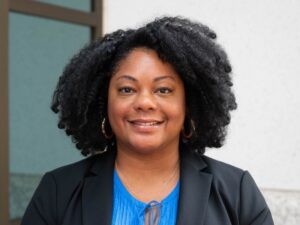
Amanda Wesson, UNC MPA Class of 2023
Thursday, February 1, 2024 – 7:30 a.m.
M.C. Benton Convention Center, Gaines 2
Winston-Salem, NC 27101
This annual event hosted during the North Carolina City-County Managers Winter Conference is a great opportunity to (re)connect with MPA alumni, faculty, and staff, and to meet current students.
You don’t need to be registered for the conference to attend the breakfast, however, you do need to register by going HERE, scroll down and click the Register Now button below City and County Management Seminar. You may need to create a login and password but once you’ve done that, you’ll see an option to register for the breakfast.
If you are having any issues, you can reach out to Brandon at 919.962.0426 who can help you through the process.
This December the UNC MPA program will be welcoming 17 new graduates into our alumni community.
Read about a few of them below.

Amanda Wesson, UNC MPA Class of 2023
Hometown: Wake Forest, NC
Alma mater: North Carolina Central University
Degree: BA Psychology, MEd Communication Disorders
What’s your current title, and what do you do?
I am a speech-language pathologist of over a decade who most recently assessed preschoolers as part of a transdisciplinary team for a local school system. In this work, I used play therapy techniques to elicit responses for assessments to help determine young children’s needs. I also recently worked as an early childhood policy analyst with a non-profit organization. There, I helped coordinate events for legislators, synthesized information and provided policy considerations on various topics related to child care and early education.
What are your plans after graduation?
I recently signed on with Wake County Budget and Management Services to become a Budget and Management Analyst beginning in January! There, I will work closely with department staff to evaluate funding and program requests, collaborate to develop alternatives, and recommend approaches that align with the County’s overall objectives. I plan to engage in continuous learning activities and also hope to maintain my license and certification as a speech-language pathologist.
Looking back on who you were at the start of the program to who you are now, how have you changed?
Wow, it feels like so long ago, but I began this process as a direct provider and clinician. I knew I had a heart for public service and always strived to produce outcomes for public benefit. My experience led me to look at each case with an individualized lens. With the knowledge and connections I’ve gained from this program, I now have a head for public service—I’ve gained technical skills, theoretical frameworks, and practical experience. More than that, I’ve opened up myself to all the possibilities and ways I can contribute to my community and the communities of those I serve.
What is one class, one project, one faculty member, one experience, one discussion, or some other aspect of our program that had an impact on you and proved to be meaningful in your professional life?
I entered this program with a general idea of which direction I thought it would take me. However, I became interested in budget and management while taking PUBA 731 – Public Financial Management, taught by Monica Allen. I assumed it would be merely accounting, but it is much more comprehensive. It encompasses data, strategy, stakeholder and citizen engagement, problem-solving, and writing—many of the things that attracted me to the field of speech-language pathology. In taking this course, I realized how I could make a more significant impact at a macro level to support systems that provide education, public health, and human services.
A brief quote or piece of advice for those considering the UNC MPA or a career in public service?
The UNC MPA program has been instrumental in shaping my journey from a seasoned speech-language pathologist to an emerging public administrator in budget and management services. Embrace the opportunity to broaden your horizons, as the skills and insights gained here will empower you to make a meaningful impact in the lives of others.
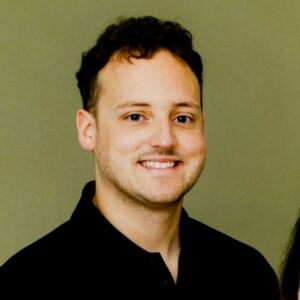
Shane Rudloff, UNC MPA Class of 2023
Hometown: Denver, CO
Alma mater: Ohio State University
Degree: BS International Relations
What’s your current title, and what do you do?
I am currently a Senior Grant Writer at a nonprofit called Growing Home in Westminster, CO. I build relationships with funders and secure grants for our programs which include a food pantry, a community garden, housing assistance, and early childhood education resources.
What are your plans after graduation?
After graduation I’d like to pursue a career in local government, preferably at the City Manager’s Office where I can interact with all kinds of stakeholders that work with government. I live by learning and enjoy observing the contexts and perspectives of different experts and professionals in the public sector.
Looking back on who you were at the start of the program to who you are now, how have you changed?
Looking back at who I was before I started the program, I’d say I’m much more cognizant of the inner workings of how the government operates. I was originally aware of the surface level details (elections, bills becoming law, politics, etc.), but now I understand there’s more that goes into getting things done (budgets, hiring the right people, working with private contractors, etc.). I have a more holistic view of how the public sector works.
What is one class, one project, one faculty member, one experience, one discussion, or some other aspect of our program that had an impact on you and proved to be meaningful in your professional life?
I would say that one class/experience that really stood out to me during my time at UNC was the immersion. I loved the opportunity to get to meet some of my peers in person which is a rarity for an online student. There I was able to meet some incredible professionals and people, and I am still very close friends with some of my classmates.
A brief quote or piece of advice for those considering the UNC MPA or a career in public service?
This is a pathway that provides an opportunity to help shape the way communities, states, and nations operate. It will make you a person people turn to when they are looking for solutions, and you will do little things daily that contribute to improving something. I take pride in that fact, and that is what public service is all about.
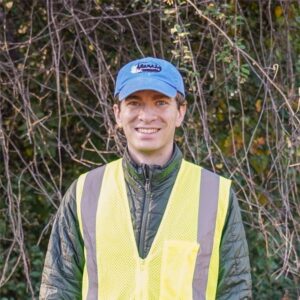
Joanthan Hill, UNC MPA Class of 2023
Hometown: Raleigh, NC
Alma mater: Duke University
Degree: Public Policy and History
What’s your current title, and what do you do?
My current title is Executive Director of Keep Charlotte Beautiful. I’m a full-time employee of the City of Charlotte, but it’s a little like running a nonprofit within the city government. The program has a City Council-appointed board, its own social media channels, and conducts some fundraising. An AmeriCorps service member (whom I manage) and I run numerous, community-driven initiatives related to litter prevention, waste reduction, and beautification.
What are your plans after graduation?
Throughout the MPA program, I’ve been able to apply lessons learned from class to greatly expand the programming scope and offerings of Keep Charlotte Beautiful. I hope to continue that after graduation. Two of my goals for the coming year are to launch a resident-operated ‘Friends of Keep Charlotte Beautiful’ spin-off nonprofit to enable easier fundraising for the program and to implement an in-depth litter study using our city’s Solid Waste Services department and students from UNC-Charlotte.
Looking back on who you were at the start of the program to who you are now, how have you changed?
When I applied for the program, I had just learned that I had received funding to hire an AmeriCorps service member for the first time, and wanted to hone in my leadership skills. The MPA program has enabled me to do that and more. In some instances, the MPA program enabled me to put a theoretical name to practices I was already implementing. In many others, it enabled me to consider new ideas and new ways of managing. I have become a more strategic-thinking, results-driven, and public-oriented manager because of it.
What is one class, one project, one faculty member, one experience, one discussion, or some other aspect of our program that had an impact on you and proved to be meaningful in your professional life?
As I mentioned to my oral exam panel, the idea of inspiring a shared vision from Kouzes and Posner’s The Leadership Challenge has stuck with me. Much of the work I do is collaborative, but a lot of it is driven by me, rather than being driven with the help of others. That message has reoriented my focus towards public engagement. In other words, I have what I think are a lot of great ideas, but they may not be what the public wants or even needs. Deploying a consensus-driven approach to tackling wicked problems provides for a more meaningful solution while broadening my perspective as a public servant.
A brief quote or piece of advice for those considering the UNC MPA or a career in public service?
Always consider how you might apply the lessons learned in class to your day-to-day work. Putting those theories to practice not only helps you learn more about them, it enables you to determine what works best for you.
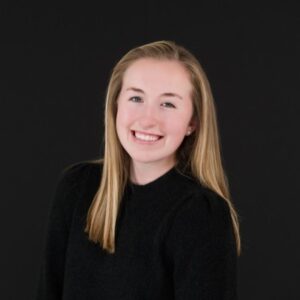
Julia Murphy, UNC MPA Class of 2023
Hometown: Pittsfield, MA
Alma mater: Providence College
Degree: BA in Political Science, Minor in Public and Community Service Studies
What’s your current title, and what do you do?
I am a Special Assistant to the Deputy Secretary at the United States Department of Commerce. I directly support the Deputy Secretary by overseeing his external engagements, supporting the day-to-day operations of the office, and advising on policy matters. As a political appointee in the Biden-Harris Administration, most of our work is centered around advancing and implementing the President’s priorities.
What are your plans after graduation?
I’m only three months into my current job so I’m hoping to stay for a while! I was working in the Massachusetts State Legislature when I began the program, so making the leap to the federal government and working in the executive was a goal that I had for a while and I’m grateful I was able to achieve while obtaining my MPA.
Looking back on who you were at the start of the program to who you are now, how have you changed?
My time in the program has reaffirmed that I want to be in public service for as long as I can. Taking classes while getting real-world experience allowed me to develop a public administration lens that I use every day to think about challenges, potential solutions, and how to move the needle forward. My decisions are directly informed by the frameworks and practical applications that I encountered in my courses. My ability to communicate concisely and effectively has significantly improved, and taking a deep dive into my leadership abilities has given me tremendous confidence both personally and professionally.
What is one class, one project, one faculty member, one experience, one discussion, or some other aspect of our program that had an impact on you and proved to be meaningful in your professional life?
This is such a hard question because I have genuinely learned so much from every professor, class, and classmate I’ve had! I think back to Prof. Julie Bregman’s Institutions and Values course that I took in my first semester of the program where we talked about equity as a core and competing value of public administration. When talking about equity versus effectiveness, I remember having a lightbulb moment where I said something along the lines of, “If programs aren’t working for the people they are intended to serve equitably, are they effective at all?” From this point forward, equitable public administration has been top of mind for me and has driven my focus areas in the program and the way that I think about the world, and is something I hope I can continue to foster as a public service leader. Government is a powerful tool to help people, and I would push back on anyone who claims that you can’t have equity and efficiency at the same time. It may not be easy, but it is our job as leaders to find a way forward.
A brief quote or piece of advice for those considering the UNC MPA or a career in public service?
The answer to both is simple — do it! There are a lot of complex challenges that our world faces and we need bold, courageous, thoughtful, and visionary leaders to take those challenges on. The UNC MPA equips you with the tools to tackle those problems, and you learn from the best and brightest faculty and classmates. Public service is an honorable undertaking and allows you to make an impact on other people’s lives in a way that other professions don’t offer. The MPA program was one of the best choices I’ve made and I feel incredibly well-prepared for wherever my path may take me.
This Fall we welcomed 29 new students into the online format of our MPA. They come from different geographic regions, bring varied interests and experiences, and we are so happy they chose us. Read about 3 of them here!
Hometown: San Diego, CA
Alma mater: UNC-Chapel Hill
Degree: Bachelor’s degree in Public Policy
Where were you before you joined the MPA program?
I attend the online MPA@UNC program from Nashville, Tennessee where I lead education and outreach efforts for Metro Nashville Waste Services, a division of metropolitan government. I develop waste reduction programs and promote resilient waste, recycling, and composting collection for Nashville residents.
I was born and raised in San Diego, California and I attribute my passion for local environmental regulation from growing up surrounded by these policies in my own community. I took this passion with me to Chapel Hill when I attended Carolina for my undergraduate studies in Public Policy and Environmental Studies. I would not be where I am without the expertise and guidance from UNC Public Policy faculty, and I am thrilled to be returning virtually to Carolina to further my skills for public service.
What are your areas of interest in the program?
I was drawn to the MPA@UNC program because of its clear focus on building public service leaders. I have already enjoyed meeting fellow public servants in my first semester classes – some of my classmates are city planners, librarians, civil affairs officers, municipal information technology managers, and elected officials. I enjoy opportunities to get to know my classmates and learn from their specialized experiences within public service.
I also plan to concentrate in Local Government, which includes coursework such as City and County Management, Productivity Improvement in Local Government, and Governmental and other Nonprofit Accounting and Reporting. I look forward to learning a deeper understanding of local government structure and function through this coursework.
Why did you decide to get your MPA at UNC?
Through my combination of undergraduate and professional work experience in waste reduction, I envision a career path for myself championing solid waste regulation to serve communities across the United States. The MPA@UNC curriculum provides the academic and public service framework that will position me for greater professional success in this field.
It is an honor to be furthering my public administration education at my alma mater and the country’s first public university. I value that Carolina faculty are committed to understanding and improving government.
Hometown: Richmond, Virginia
Alma mater: Hampton University
Degree: Bachelor’s degree in Finance
Where were you before you joined the MPA program?
Before I joined the MPA program I was doing a few things. First, I am currently a Bank Examiner at the Federal Reserve Bank of Richmond. Second, I am a JV Football Coach at Glen Allen High School. For me this is my day-to-day life, and those two roles definitely keep me busy.
What are your areas of interest in the program?
There are many things about the program that interest me but so far my intro to public administration course has kept my attention the most. To see the connection between how governments interact with each other has super interesting and has opened my eyes to the roles we can play in public administration.
Why did you decide to get your MPA at UNC?
I decided to get my MPA from UNC because I have always wanted to be a Tarheel. My parents used to bring to the football games as a kid and I loved the Tarheel spirit. In addition to that, my mentor at the Federal Reserve went through the MPA program here and loved it! So I truly only had one option.
Hometown: Royal Oak, Michigan
Alma mater: Michigan State University
Degree: Bachelor’s degree in Social Relations and Policy
Where were you before you joined the MPA program?
I graduated from Michigan State University in 2014 with an undergraduate degree in Social Relations and Public Policy. I then began working at a high school in Detroit through the College Advising Corps, an AmeriCorps program. After my AmeriCorps service ended, I moved to Washington, DC, where I began working in program operations at the Relay Graduate School of Education—a nonprofit institution of higher education that provides a variety of professional development programs to teachers and school leaders across the country. I now live back home in Metro Detroit.
What are your areas of interest in the program?
I have greatly enjoyed the trajectory of my career thus far, working in direct community outreach, program operations, and partnership development. I am eager to get better at the work that I have been doing and to learn how to be a stronger leader at public service institutions. The MPA@UNC covers topics that I am interested in—for example, how can I be a strong organizational leader, particularly in the nonprofit space? How can I better collect, interpret, and react to data? How can I be a good steward of public dollars?
Why did you decide to get your MPA at UNC?
The MPA@UNC was my top choice when looking at graduate programs. This program is offered online, which would allow me to stay in Michigan, stay in my current role, and ensure a strong alumni network both in and out of North Carolina. The interactive structure of the program ensures that I will have the opportunity to engage in the material, not just complete asynchronous assignments. Finally, I was excited at the opportunity to visit campus and meet fellow students at an Immersion weekend on campus.

Students take a sip from The Old Well on the first day of classes on the campus of the University of North Carolina at Chapel Hill. August 21, 2023.
(Jon Gardiner/UNC-Chapel Hill)
The waning days of August bring new academic terms for students enrolled in both the on-campus and online formats of the UNC Master of Public Administration program. UNC MPA students represent a wide range of professional experiences, academic disciplines, interests, and career ambitions—but all are bound by a common interest in public service.
Below, we caught up with some of the newest Tar Heels joining the program this fall both in-person and remotely. Read on to meet a few of these current and future public service leaders.
Hometown: Denver, North Carolina
Alma mater: UNC-Chapel Hill
Degree: Bachelor’s degree in psychology and English with a minor in creative writing
Where were you before you joined the MPA program?
Prior to returning to UNC, I was participating in a two-year fellowship with the Town of Spencer through the School of Government called Lead for North Carolina. I am continuing to work for the Town while I complete my MPA.
What are your areas of interest in the program?
My primary interests are community development, resident-retaining downtown development, public art, and placemaking projects. I am currently in the process of developing a downtown mural walk in Spencer that will encourage visitors to the North Carolina Transportation Museum to come across the street and engage with the community.
Dual degree with City/Regional Planning
Hometown: Coral Springs, Florida
Alma mater: Florida Atlantic University
Degree: Bachelor’s degree in criminal justice with a minor in political science
Where were you before you joined the MPA program?
Before graduating (from FAU), I was involved with two organizations: Color of Change and Florida Student Power Network. These groups are what really got me involved in community organizing and gave me a first-hand view of problems in my community. I saw how little trust community members had in the government to enact effective change and wanted to act as a bridge between community needs and actions. After graduating, I continued working with those organizations as well as others, where I got to lobby in Tallahassee with state legislatures, participate in monthly citizenship drives to help immigrants in South Florida gain citizenship, and other community organizing efforts.
Why did you decide to get your MPA at UNC?
I knew I wanted to stay in the South to see how other states were handling their own issues and how those solutions could translate to Florida, so that is what drew me to North Carolina. UNC’s MPA program emphasizes practice and theory in a way that is unique from other programs; that made me confident that I would be equipped upon graduating with the skills I need to be an effective advocate for the communities that I want to fight for. I am most interested in community and economic development at either the local or state levels because of my specific focus on being an advocate for the most disenfranchised groups in Florida.
Hometown: Raleigh, North Carolina
Alma mater: Appalachian State University
Degree: Bachelor’s degree in criminal justice
Why did you decide to get your MPA at UNC?
During my time as an intern with the Charlotte-Mecklenburg Police Department, I was able to interact with high-achieving department officers, many of whom I found had something in common: a master’s degree in public administration. After this experience, I realized to become the best law enforcement officer I could be, as well as reach the highest levels of law enforcement, I too would need to attain an MPA.
I initially had many questions about how I would fit into UNC’s MPA program, as a career in law enforcement is atypical of UNC MPA students. (Director of Admissions) Cara Robinson answered all my questions and put me in contact with current students, who assured me that the program would be beneficial to my career aspirations. A constant refrain that I heard attached to the UNC MPA program was that once you were a part of the program as a student, the program would do everything in its power to help you succeed. This gave me a great sense of comfort with the program and made the decision to attend UNC a simple one.
What are your areas of interest in the program?
I am interested in a career in federal law enforcement after the MPA program. Leadership is invaluable to law enforcement. Being able to communicate professionally, work within and lead a team, and inspire fellow officers and citizens are all critical components of leadership in policing and are skills that I am confident will be sharpened through the MPA program.
Hometown: Birmingham, Alabama
Alma maters: Mississippi State University (B.A., M.A.), University of Southern Mississippi (MLIS)
Degrees: Bachelor’s degree in English, Master of Arts, Master of Library and Information Science
Why did you decide to get your MPA at UNC?
I decided to get my MPA at UNC because I want to build my leadership skills and learn more about how to build strong foundations for public organizations. I have seen what solid ground-level support can do for an organization, and I want to become that source of support in the organizations where I work. I am also really interested in building community both within organizations and between public entities and their communities. I love this work and want to build my strategic planning, organizational management, and personnel management skills.
What are your areas of interest in the program?
I am currently the library director at the Hocutt-Ellington Memorial Library, a municipal library in Clayton, North Carolina. I am especially interested in organizational management, internal communications, and community engagement. I believe that organizations that focus on building strong, connected teams are effective and responsive to the public.
Over the past academic year, UNC MPA piloted the Student Professional Development Grant program. This initiative provides up to $250 to every student for professional development expenses such as conference attendance, professional meetings, workshops, or professional organization membership. This funding is in addition to program-sponsored professional development like registration for the North Carolina City and County Management Association Winter Seminar and School of Government courses.
During the pilot year, the program had nine students apply for and be awarded funds. Students used the funds for experiences ranging from leadership summits and registration costs, to travel expenses for conferences. To receive funding, students must apply for development opportunities, discuss how the experience fits with their professional goals with Allison Binkley, the Associate Director of Career Services & Professional Development, and then reflect upon the experience afterwards. The sponsored experiences provided tremendous value for the students and a few shared their thoughts on the experience:
“I was able to network and meet with alumni, learn about skills needed for MPA students, and attend coaching sessions with current managers.” – Shane Digan
“Prior to the conference, I knew almost nothing about the structure and behavior of a budget office. The conference sessions introduced me to concepts like zero-based budgeting and participatory budgeting. The sessions were helpful, but nothing compares to connecting with budget professionals from across the state.” – Scott Powell
“I attended presentations ranging from the Chair of the National Endowment for the Arts, regional artists, and community development advocates, to public art funders. I also networked with arts administrators from across the South. Some of my takeaways include: grant processes for public art (specifically focusing on the story to be told with the art rather than the artists’ resume. Start with a letter of intent before accepting full proposals), considerations for equitable pay for guest artists from near and far, and how to engage communities who have been impacted or will be impacted. These takeaways were important to me as I consider foundation funding, leading proposal reviews, and equitably building community through the arts.” – Lauren Duncan ‘22
After a very successful pilot year, the MPA program is excited to continue to continue this initiative for a second year and encourage professional development relating to students’ unique interests.
UNC MPA student Melissa Cordell has recently launched the Women in NC Government, available on Apple Podcasts and Spotify. Each month features a new profile of a remarkable woman in government making a positive impact on their community. Be sure to check it out! The first episode is with UNC MPA alumna, Cecily Hamilton who serves as the Strategic Initiatives Analyst for the City of Durham, NC!
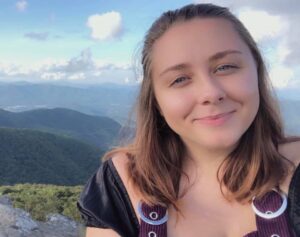
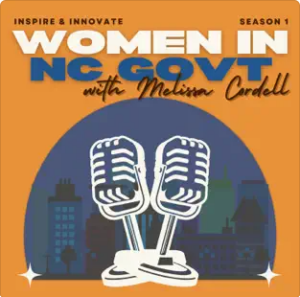
Melissa started this project as good government is a passion of hers. She hopes this can lead to more innovations in government work, serve as an inspiration for professionals, and recognize amazing women in a wide range of public service roles in our state.
Melissa received her undergraduate degree from UNC Chapel Hill in Women’s and Gender Studies and is a current UNC MPA student in the online format. She just started a new role with the Congressional & Public Affairs Staff in the Office of Public Affairs & Consumer Education for USDA-FSIS.
When North Carolina native Sherese Bonner graduated with an undergraduate degree in public policy from the University of Virginia, she came to two conclusions: she wanted to learn how public policy was implemented, and she was ready to come back to North Carolina. Those conclusions led her to the UNC Master of Public Administration program.
“I wanted to learn how we bring programs and policies to life through implementation,” Bonner said. “I am also from North Carolina and grew up right outside of Charlotte. I knew I wanted to come back eventually, and a great way to do that was to complete my graduate studies here.”
Bonner is one of 37 UNC MPA graduates who will receive their degrees this weekend in Chapel Hill. She has used her rich and varied experiences—including a Professional Work Experience (PWE) with the Federal Reserve Board, a John M. Belk Impact Fellowship, serving on the program’s Diversity Committee, and serving as a Research Assistant for the Local Government Workplaces Initiative (LGWI)—to secure a finalist position with the U.S. Presidential Management Fellows (PMF) program. The inaugural Flo Miller Diversity in Public Service Scholarship recipient, Bonner has found many ways to apply her experiences in the MPA classroom to practical, real-world work.
Among her most meaningful experiences was her summer PWE with the Federal Reserve Board, which she continued during the academic year. Bonner began assisting with operations in the Large Institution Supervision Coordinating Committee. While working with human resources, she created a senior leadership onboarding manual, planned a training expo for bank regulators, and planned and hosting team-building activities. When the fall semester began, she transitioned to work with the Corporate Governance and Secretariat Team, where she worked on a policy gap analysis and joined senior leadership meetings.
“It’s been a tremendous and wonderful opportunity,” Bonner said. “I have been able to directly apply what I’ve learned in courses like Organizational Theory and Human Resources Management. It’s one of the best experiences of my graduate school career.”
With ongoing economic instability in the post-COVID era, Bonner also values the opportunity to watch the Federal Reserve response. “There is so much going on in our financial system, and I’ve had a front seat to what top decision-makers are thinking and doing in this really unique time. It’s been an amazing experience.”
Relationships with School of Government faculty, including Kimalee Dickerson and Leisha DeHart-Davis, were a valuable part of Bonner’s experience. She worked with DeHart-Davis in LGWI to carry out workplace climate surveys and advise local governments on best practices to improve workplaces. Her experiences with the initiative provided hands-on experience that directly translated to internships and fellowships.
“Dr. DeHart-Davis really trusts her research assistants to take on important projects, communicate with clients, and assist with deliverables,” Bonner said. “We’re meeting a critical need for local governments and that experience was very impactful. It added so many tools to my toolkit that I can carry forward in my career.”
Bonner also credits Dickerson for impacting her graduate school experience as advisor to the program’s student Diversity Committee. Through Dickerson’s “fantastic advice and support,” the committee put on a multitude of events for MPA students this year that tied diversity and equity to the public administration workplace.
Bonner also served as a John M. Belk Impact Fellow during her time in the MPA program. The fellowship serves as a training ground for future social impact leaders, placing students from graduate schools, four-year institutions, and community colleges in positions to support and advance education initiatives. Working in the Office of Governor Roy Cooper, Bonner assisted with an array of initiatives under the workforce policy advisor.
“I was able to work on projects related to early childhood transportation, youth apprenticeships, HBCU and minority-serving institutions, and prison education programs,” Bonner said. “It was great to apply much of what I studied during my undergraduate career and there were many connections to commerce that I’m hoping to use in my future work.”
The next chapter in Bonner’s journey will take her to Washington D.C. as a Presidential Management Fellow. PMF is the premier leadership development program for individuals launching careers in federal government. After a rigorous testing and interview process, Bonner landed a position in the Department of Commerce, working in the Office of Secretary Gina M. Raimondo. Her work as a program analyst will allow her to apply her MPA and professional experiences to policy implementation within the department’s 13 bureaus.
“Many bureaus need support with financial management, HR, contracts, risk management, and data governance to ensure smooth policy implementation,” Bonner said. “I’ll be working on a cross-cutting team to assist with this work in the Implementation Coordination Office.”
Bonner’s time in the classroom may be complete, but she will take her UNC MPA experiences with her every step of the way.
“I love North Carolina. UNC is a top tier institution and it was my dream school growing up. It felt like a full circle moment to end my time in higher education with a degree from Carolina.”
Eugene Bradley grew up close to Morehead City, North Carolina, where he lived until 2012 when he accepted a full-time Kansas Air National Guard position. Currently residing in Lawrence, Kansas with his family, Bradley is now enrolled as an online student in the UNC MPA program.
Bradley decided to pursue the UNC MPA to help increase the opportunities once he retires from the military. An active advocate for guardsmen in Kansas and across the country, he expressed a desire to continue serving the public, even after he hits two decades of military service.
“I am trying to seek out opportunities that will challenge me while also allowing me to work with a new set of people,” he said.
Enrolling in the UNC MPA program has allowed Bradley to gain experience working in a non-military setting, particularly by competing in the NASPAA Simulation Challenge. This Challenge is an annual competition where NASPAA-affiliated programs invite students to participate in a competition with a cash prize to help solve a particular public sector challenge. The 2023 topic—wildfires.
Bradley was placed with a team of five other students from across the country, and participants were placed in various roles within a town task force to build the mountain town’s wildfire mitigation plan.
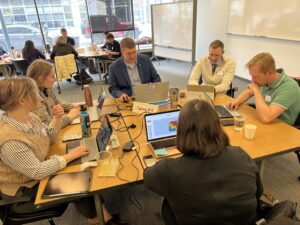
As in real-life public sector roles, the teammates had competing interests and goals as assigned before the competition. The challenge is similar in many other workplaces—how to balance multiple priorities within the group while putting together a collaborative plan to reach a shared goal.
Bradley’s travel to the competition, held in Denver, Colorado, was supported and sponsored by the UNC MPA program’s Malchus Lynn and Dr. Amanda Giannini Watlington Fund, an endowment established by alumnus Mal Watlington ’69 and his spouse. This endowment also sponsored the nomination of four other current students who participated in this year’s competition.
Following the experience, Bradley expressed gratitude in stepping outside of his comfort zone.
“More often than not, I bring back new tools or lessons that I can apply to my full-time position,” he said.
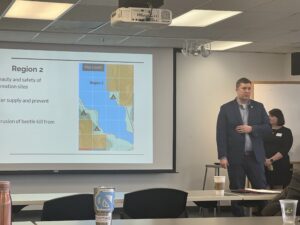
Bradley was also grateful to join a team with perspectives from incredibly diverse backgrounds. Ranging from actual wildland firefighters to more traditionally young graduate students fresh out of college, each contributed to the challenge with their differing perspectives.
“I learned a lot from this experience and especially my teammates,” he said. “We had good respect for each other and balanced our competition goals well while also having fun, ensuring it was an effective mitigation plan.”
With a focus of the competition being equitable policies, the teammates also learned how many underserved populations are often forgotten in the wildfire mitigation process. The group learned what risks the disadvantaged community members saw, including higher risk of property loss, inhalation and health concerns stemming from prescribed burns, and other results made from decisions that affect the disadvantaged.
Bradley credited the UNC MPA program for teaching him the importance of equitable policies in balancing the needs of all interested parties.
“The immense opportunities in class to debate and discuss our material helped prepare me for intense discussions we tackled during our mitigation plan with people I had never met,” he said. “I’m a better communicator, listener, and I can analyze things far better now when I hear from multiple sides.”
After he graduates in December 2023, Bradley’s plan is to stay with the military for at least another five years. After his service, his goal is to return to North Carolina with his family to work in local government and—ultimately—enjoy retirement along the coast when his public service career concludes.
By Brandon Bieltz, University Communications, Monday, March 20th, 2023
Shayla Douglas launched into a career giving back to North Carolina as the downtown and small business development manager in Garner, North Carolina. Douglas is working to revitalize the downtown area and strengthen the economy of the Wake County town of 31,000.
For Shayla Douglas, success after college meant finding a way to give back to the state she calls home and working toward a better future for North Carolinians.
The double Tar Heel is doing just that as the downtown and small business development manager in Garner, North Carolina. Douglas is working to revitalize the downtown area and strengthen the economy of the Wake County town of 31,000 by supporting small businesses and attracting new ones to establish roots in the community.
Read the full story on UNC.edu.
Sixteen. As high school juniors get behind the wheel and taste freedom for the first time, a boy in rural Indiana was finally liberated in a different sense: from years of abuse in the foster care system.
“My first bout with public administration was being able to convince the state of Indiana that the foster care system was doing more harm than good,” Mat Bunch (MPA ’22) said, a graduate student in the UNC-Chapel Hill School of Government. “I was set up to be in an independent living program where I had my own house junior year of high school. I’ve been raising myself since.”
Bunch graduates with an MPA this December. Despite the many achievements Bunch has accumulated – from class president in high school to publishing a memoir during graduate school – his life’s trajectory was anything but normal, let alone anything a child should have to face.
At the age of six, Bunch became a foster child in the Indiana state system. For six more years, he lived under the roof of an abusive guardian.
“For that woman, I was a $2,400-a-month check,” Bunch said.
He recalled wearing makeup to go to school in order to cover his guardian’s blows and would miss school altogether if his physical marks revealed too much. As young as eight years old, he pleaded for help at school. It took four times for anyone to listen.
“Every time I would get the courage to try and get out of the situation, the public school system didn’t believe me,” he said. “The investigator would come, she’d take pictures, and I would be put back into that abusive home that very day.”
Merely being believed wasn’t enough. As soon as the state removed Bunch from the abusive household, amid teenage years of personal discovery among the LGBTQ community, he was placed in a foster home that seemed all but perfect – until he received an ultimatum: to be straight or return to the orphanage. He chose the latter.
“That’s a very young age to say ‘I would rather go to the orphanage and be faced with that than pretend to be somebody I’m not in this foster family,’” Bunch said. Their love, or lack thereof, was conditional.
Once the state of Indiana granted Bunch permission to leave the foster care system, he got his grounding. He went on to attend college at Indiana University where he graduated from the O’Neill School of Public and Environmental Affairs. From there, Bunch knew he wanted to contribute to the public service sector in some way.
“Being discriminated against was probably the biggest propeller because I wanted to be an advocate for others in any type of way,” Bunch said.
While he always envisioned post-graduate life in law school, a job opportunity at the North American Electric Reliability Corporation (NERC) altered his path. For four and a half years, Bunch wrote grid Reliability Standards to ensure a sustainable and secure bulk-power system from the U.S. and Canada to part of Mexico.
Bunch has since shifted to a job in the private sector where he is responsible for North American energy compliance.
“I was in the public sector for a while,” Bunch said. “But having this degree and taking these classes, I was able to take public sector values – leadership development, organizational theory and work with leadership to influence the compliance culture,” Bunch said.
Following commencement, Bunch plans to continue his work in energy policy.
“While at Carolina, I built community among colleagues and friends,” he said. “This has made all the difference.”
— Kate Slate